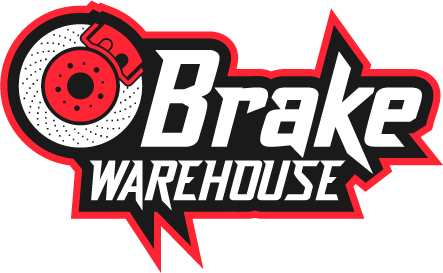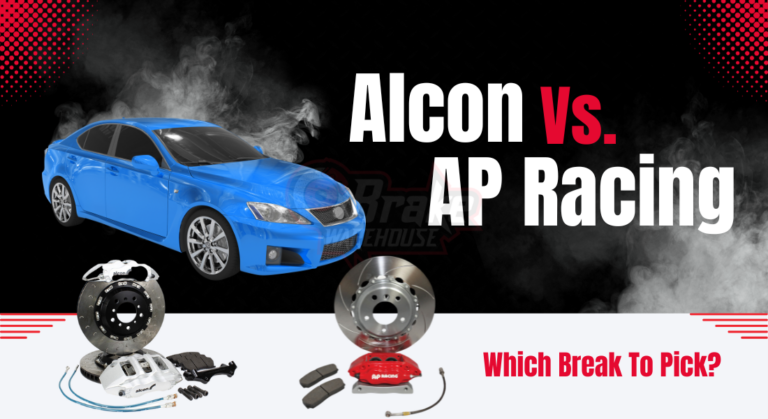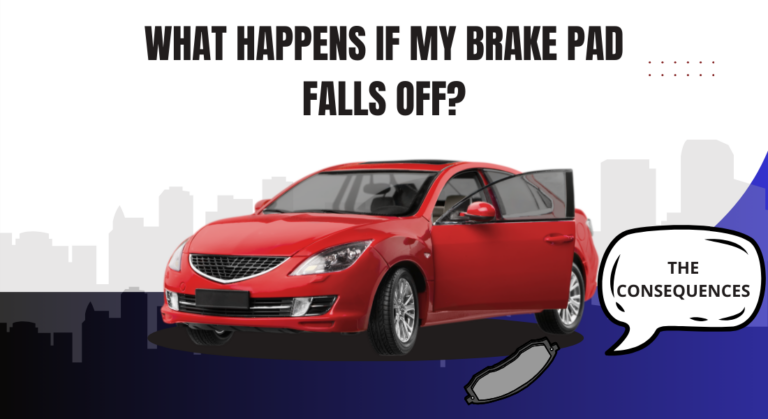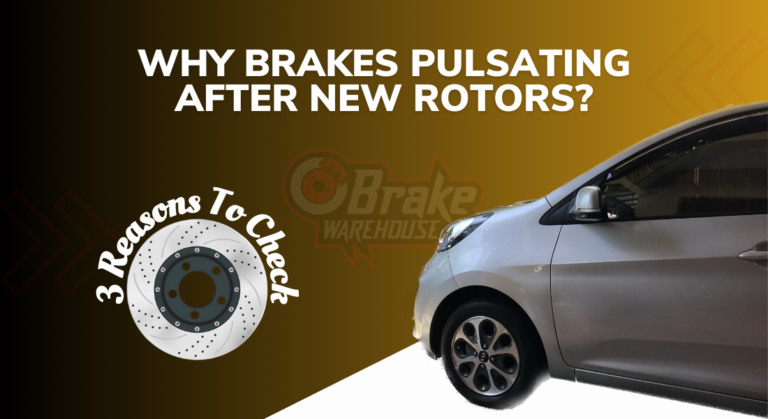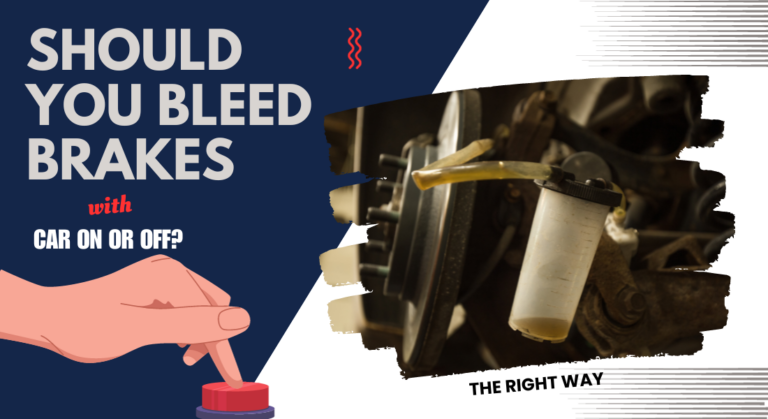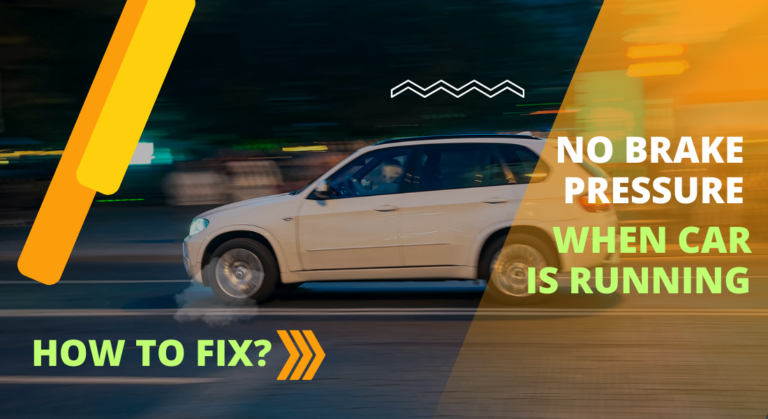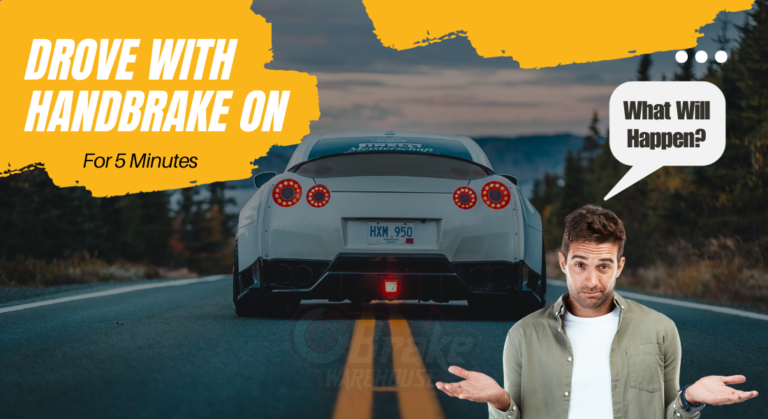Drum Brakes Squeaking – What Are The Causes & How To Fix?
Even during their regular operation, your car’s brakes may produce grinding, squeaking, or squealing sounds. Brakes function by applying high-friction materials to a rotating metal surface. The noise can result from vibrations and surface imperfections.
In the case of drum brakes, the primary culprit behind screeching and squealing is usually worn-out brake shoes. Other potential causes may include improper adjustments or contact with the axle backing plate.
Typically, squeaking should not persist continuously or become excessively disturbing, but occasional issues can arise. Numerous factors contribute to this issue, which we will explore later in this article.
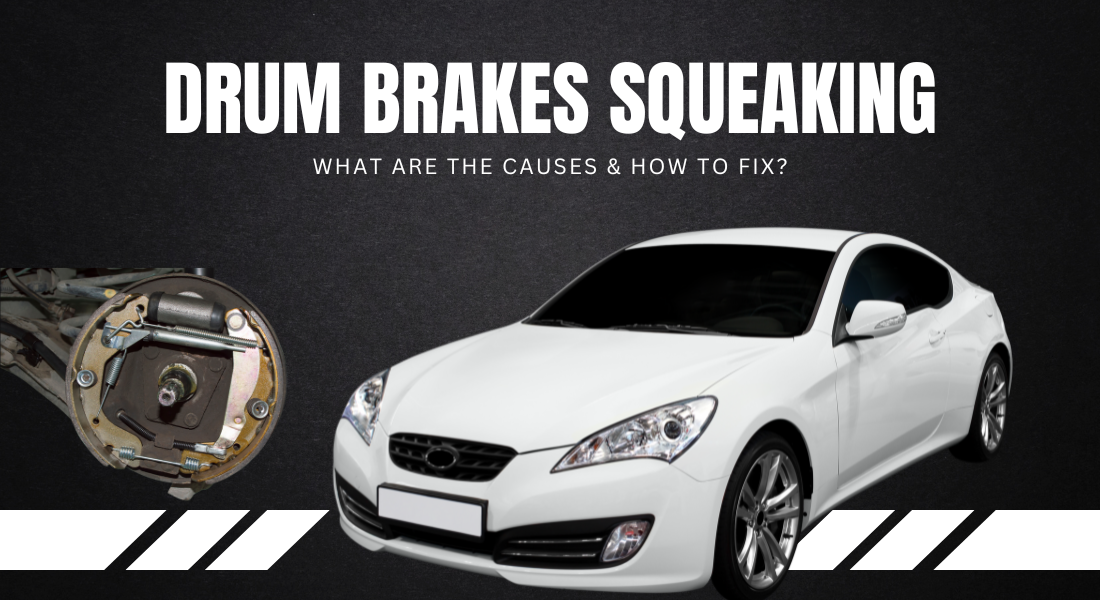
What Causes Drum Brakes Squeaking? with Solutions
When you hear screeching noises from drum brakes, it warns of a significant issue. To accurately diagnose the problem, removing the wheels and drums and promptly seeking professional servicing is crucial.
Here are several typical brake noises, their reasons, and steps to resolve each issue.
Moisture Exposure
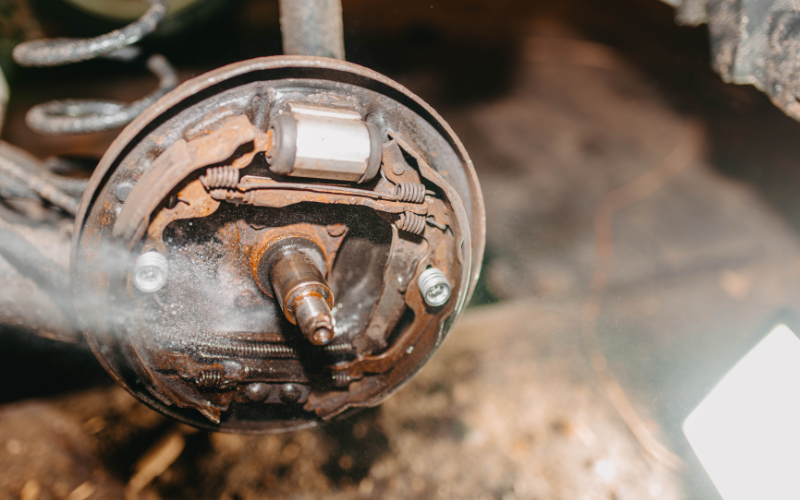
The primary culprit behind squealing drum brakes is moisture. When your car’s brakes come into contact with water, rain, or high humidity, a thin layer of rust starts to develop on the rotor.
If your drum brakes get wet and start squealing, there’s no need to worry. The reason is it’s a normal brake noise. When you engage the brakes, they effectively remove the surface rust from the rotor, causing the unpleasant squeal.
Minor rust accumulation overnight is nothing to be alarmed about. After driving a few miles, your brakes will return to their regular operation.
Solution
Take precautions to prevent prolonged exposure of your brake pads to moisture. Excessive rust buildup can lead to surface imperfections on the rotor. Transferring to the brake pads while driving.
This can result in the irritating sounds of squeaky brakes and potential vibrations due to an uneven rotor surface.
Read Also: Can I Spray WD40 On My Brakes To Stop Squeaking? The Truth
Insufficient Lubrication
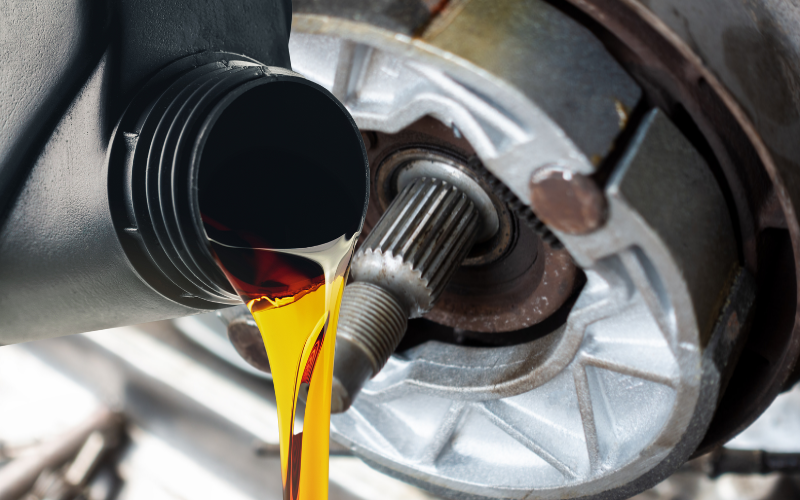
Many modern cars feature disc brakes. But some older and vintage models still employ drum brakes at the rear or on all wheels.
In the case of drum brakes, if the contact points between the brake shoe and backing plate lack proper lubrication, they can start to rust. This leads to the brake shoe rubbing against the backing plate, resulting in a distinctive rhythmic squeaking noise as the tires rotate.
Solution
Preventing squeaking and brake noise requires regular maintenance. Also, keeping the contact points well-lubricated with brake grease is crucial.
Ensure you use high-quality lubricant on all brake pad contact points, excluding the brake pad. If you’re uncertain about the procedure, it’s advisable to consult your mechanic, who can swiftly resolve the issue of brake squealing.
Note:
- Be cautious not to confuse brake lubricant (like brake grease) with brake fluid. The hydraulic fluid in your brake lines is for transferring braking pressure.
Exposure to Severe Cold Weather
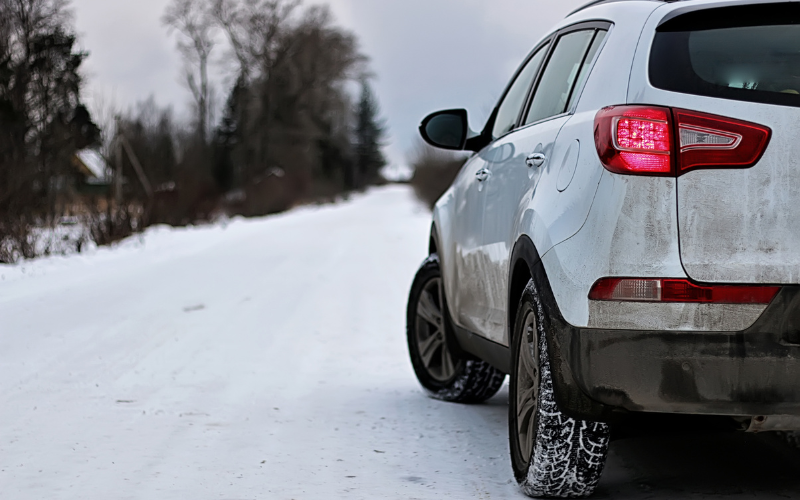
In sub-freezing temperatures, a layer of ice can accumulate on your brake pad. It results in an annoying squeal when you apply the brakes. While this doesn’t compromise your braking performance or safety, it can be unpleasant.
Driving through heavy snow or water can intensify the squeaking. The ice layer may persist longer. However, as your brakes heat, the icy layer and the accompanying squeaking will gradually dissipate.
Moisture can also lead to the formation of a thin rust layer on your brakes, but this surface rust typically wears off with regular braking.
Solution
Consider parking your vehicle in a garage or covering it overnight. Installing a block heater to warm the engine and mechanical components, including the brakes, can be beneficial. Allow your vehicle to idle for a few minutes helps warm up the engine and brakes.
Fortunately, cold-induced squealing in drum and disc brakes does not concern brake integrity or overall vehicle safety.
Read Also: Why Do Brakes Squeal When Cold Until Warmed Up?
Worn Brake Pads
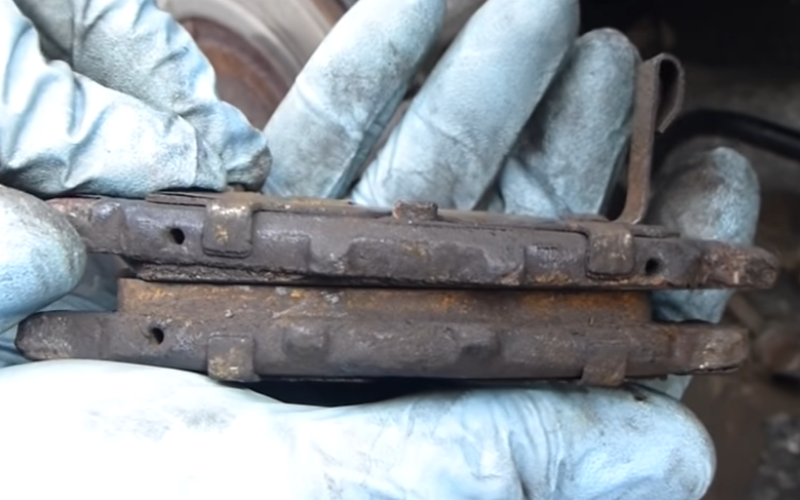
Brakes are normal to emit squeals as brake pads wear down over time. Many disc brake systems include wear indicators that contact the rotor surface before the pads reach full wear. When your brakes have worn pads, they’ll produce an unmistakable squeal.
This squeaking warns you to replace the worn brake pads promptly, ensuring continued braking performance.
Solution
Once you hear brake squealing, it’s time to enlist a mechanic’s help to replace the worn brake pads. In some cases, if the rotor has also deteriorated significantly, it may require replacement.
Some modern brake systems feature electronic wear indicators that trigger a warning light when pad wear is detected. It provides a visual alert for timely replacement.
Read Also: How Long Will 3mm Brake Pads Last? (The Ideal Thickness)
Stuck Caliper
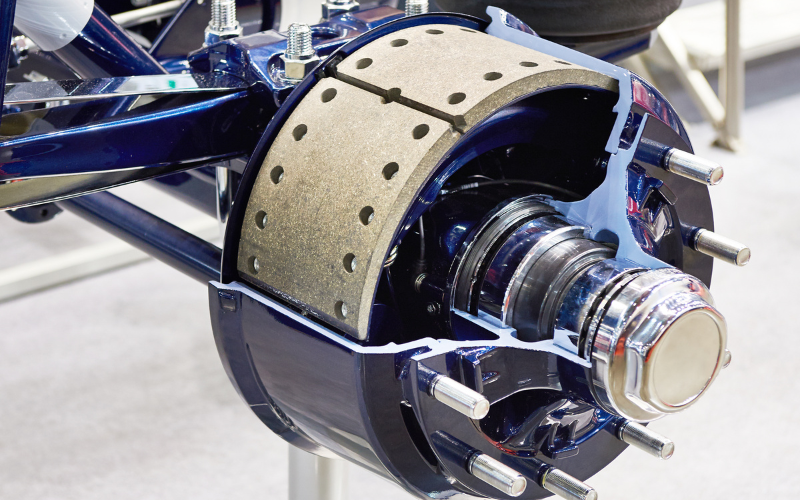
Persistent brake squealing may indicate stuck or frozen calipers in your disc brake system, even without applying the brakes. Several factors, from caliper slide issues to piston problems, can lead to a stuck caliper.
Solution
Consult a mechanic to resolve the issue and eliminate the brake squeaking before it escalates into brake lock-up.
Read Also: How To Free a Stuck Brake Caliper Piston?(11 Steps Guide)
High Metal Content in Brake Pads
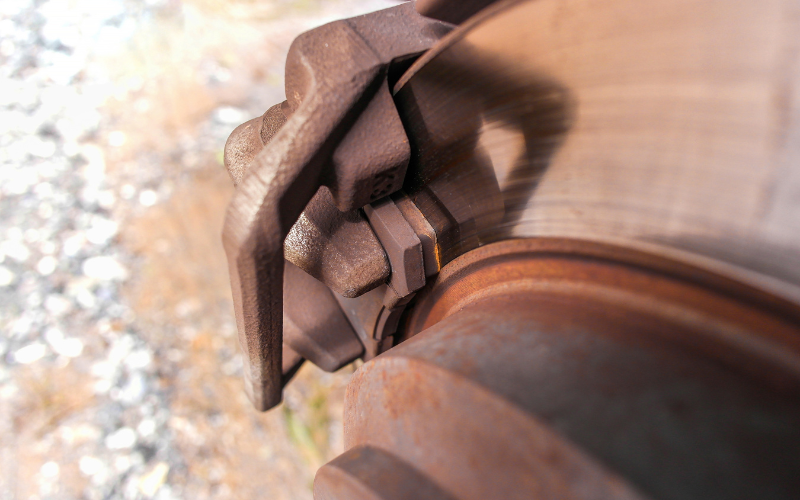
Not all disc brake pads share the same composition. High-performance carbon metallic brake pads tend to produce squeaks.
Brake pads with a higher proportion of organic materials like resin, rubber, and Kevlar exhibit less squeaking against the braking surface.
Semi-metallic brake pads contain a significant metal content pressed into the pad material, resulting in louder noise. They are commonly used in high-performance applications.
Solution
For everyday driving, consider premium disc brake pads, such as ceramic brake pads. This brake pad type generates less noise and maintains excellent stopping power.
Debris in the Brake System
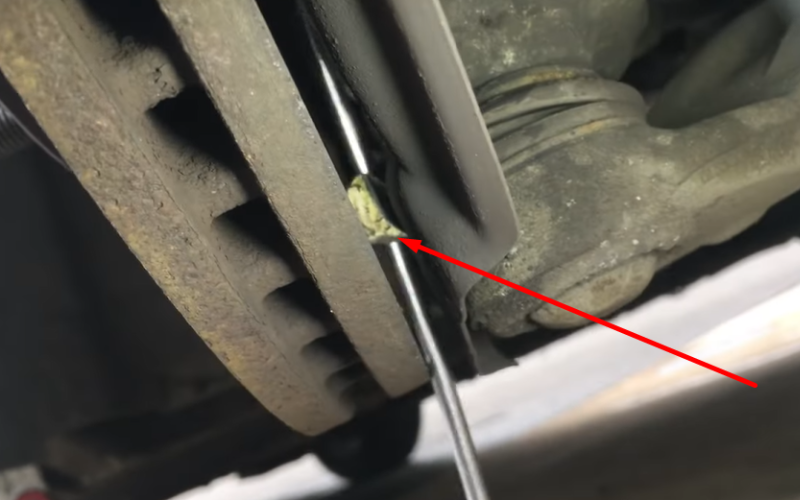
Squeaks can result from brake dust and sand, mud, or metal debris lodged in the brake pad or rotor, scraping against the pad.
Off-road driving increases the likelihood of debris accumulating on the braking surface, leading to more brake noise.
Solution
A practical solution is applying brake cleaner or sanding the brake pad surface. If this doesn’t resolve the issue, consult a knowledgeable mechanic. Let them inspect the braking system for debris or other potential causes of squeaking.
Braking Style
Repetitive brake lever pressing or riding the brakes can generate excessive heat, causing brake pad surfaces to glaze. Another potential cause is brake caliper failure, leading to friction between the brake pads and the rotor, resulting in glazing.
Glazed brake pads lose their required friction for effective braking. As a result, it becomes susceptible to cracks, fractures, and squeaking noises. In such cases, replacement is necessary.
Solution
Check for signs of glazing by running your finger along the brake pad surface, feeling for a smooth, glassy finish.
If glazing is present, schedule a brake repair service to replace the brake pads promptly. Adjusting your braking style may also be necessary to prevent future glazing and squeaking issues.
FAQs
Can rust or corrosion on the drum brake components result in squeaking?
Yes, rust or corrosion on drum brake components can lead to squeaking. When rust accumulates on the drum’s surface or the brake shoe’s backing plate, it can cause uneven contact and friction, resulting in squeaking noises during braking. Regular maintenance and cleaning can help prevent this issue.
Do high-performance brake materials tend to squeak more in drum brake systems?
Drum brake systems may experience increased squeaking with high-performance brake materials. These materials often prioritize performance over noise reduction and can generate more friction against the drum’s surface, leading to squeaking sounds.
Choosing the suitable brake materials for your specific needs is essential to balance performance and noise considerations.
Final Words
Hopefully, you are not well aware of what causes drum brakes squeaking.
A squeaking or squealing sound upon braking can stem from various factors, including worn brake pads or corroded brake lines. Swiftly addressing this issue is vital for road safety.
By comprehending each component’s role in your vehicle’s braking system and potential noise causes, you can effectively rectify the problem.

Meet Zayan, the mechanical genius behind the highly acclaimed brakes problems and solutions website. With over a decade of hands-on experience in the automotive industry, Zayan has become a trusted authority in the realm of brake systems.
His passion for cars, coupled with his expertise in solving complex brake-related issues, has earned him a devoted following of car enthusiasts, mechanics, and everyday drivers seeking reliable guidance.
